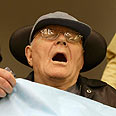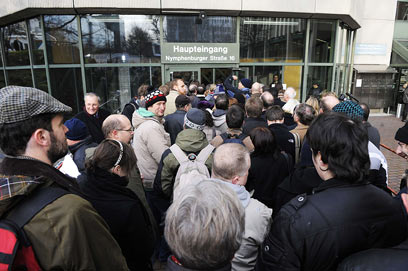
Demjanjuk trial opens
Former Nazi camp guard stands trial in Munich on charges of helping to force 27,900 Jews into gas chambers in 1943
John Demjanjuk was brought by ambulance to a Munich court on Monday to face charges of being an accessory to the murder of 27,900 Jews at a Nazi death camp, opening the final chapter of some 30 years of efforts to prosecute the retired Ohio autoworker.
The trial of the 89-year-old opened with Demjanjuk's attorney filing a motion against the judge and prosecutors, accusing them of bias.
Lawyer Ulrich Busch charged that the case should never have been brought to trial. He cited cases in which Germans who were assigned to the Sobibor camp in occupied Poland, where prosecutors allege Demjanjuk served as a guard, were acquitted.
"How can you say that those who gave the orders were innocent ... and the one who received the orders is guilty?" Busch told the court. "There is a moral and legal double standard being applied today."
The defense attorney claimed there was no difference between men like Demjanjuk and Jews who were froced to remove the bodies from the crematoriums, saying they all acted only on the orders of the Nazis.
One of the plaintiffs’ lawyers rejected that argument, saying, "Trawnikis (prisoners, mainly from the Ukraine and other Soviet countries, who were trained in the city of Trawniki in eastern Poland and helped the SS in the concentration camps and ghettos) were well fed and taken care of, Jews weren’t. Trawnikis drank and partied in the camps, Jews didn’t. Trawinki murdered, Jews did not."
"Focus” quoted one of the plaintiffs, Jules Schelvis, 88, from the Netherlands, as saying that Ukrainian guards such as Demjanjuk were particularly brutal:
"They were generally over-zealous and fanatical guards. They used their whips and rifles without awaiting further orders, in order to chase the Jews from the place where they undressed into the gas chambers. They were more dangerous than the SS," he said.
A doctor who examined Demjanjuk two hours before he was wheeled into the courtroom, covered in a light blue blanket and wearing a baseball cap, said his vital signs were all stable.
Israeli President Shimon Peres commented on the opening of the trial and expressed his hope that Germany would be successful in brining about justice. "True, he's not young and healthy anymore – but justice always remains young," Peres said during a memorial ceremony to paratroopers who were murdered in World War II.
Efraim Zuroff, the top Nazi-hunter at the Simon Wiesenthal Center, said on his way into the trial that it was important it was finally taking place.
"This sends a very powerful message that even if you didn't have the rank of an officer, you still have responsibility," Zuroff said.
German state prosecutors believe Demjanjuk, who was at the top of the Simon Wiesenthal Center's list of most-wanted war criminals, assisted in murders at the Sobibor death camp, in what is now Poland, where at least 250,000 Jews were murdered.
Jewish groups and victims' families say it is never too late for justice to be done and that the case is symbolic.

Demjanjuk entering court room (Photo: Reuters)
"We should not make the mistake of thinking that a case against one war criminal is a case against just one man," said Rabbi Marvin Hier, Dean of the Wiesenthal Center in Los Angeles.
"When the bell tolls for John Demjanjuk, it is also tolling for every other war criminal. Even if it just gives them sleepless nights," he told Reuters.
Demjanjuk, who was born in Ukraine and fought in the Red Army before being captured by the Nazis and recruited as a camp guard, was extradited in May from the United States.
He emigrated to the United States in 1951, becoming a naturalized citizen in 1958, and worked in the auto industry. He denies he was involved in the Holocaust and his family insists he is too frail to stand trail.
Demjanjuk's son said his father had been in hospital for five days in the last week to undergo a range of tests and had a blood transfusion due to a bone marrow disease.

Reporters outside Munich courthouse Monday (Photo: AFP)
"They are forcing the trial to go forward regardless of my father's condition," John Demjanjuk Jr told Reuters in a statement.
Due to his weak condition, the hearings will be restricted to two 90-minute sessions per day. His lawyer, Guenther Maull, said Demjanjuk was in constant pain and suffered from periods of mental absence.
The trial is expected to last until May 2010 and sessions have been scheduled for three days from Monday for this week. Over 200 journalists have been accredited.
If all goes to plan, the prosecution will read the charges on Monday and Demjanjuk, who could be sentenced to spend the rest of his life behind bars, will have the chance to respond. Prosecutors plan to show the court documents, including an identity card, to prove he was at Sobibor and they will call about 20 witnesses.
While the case has attracted enormous global interest, many Germans would prefer to draw a line under the Nazi past and focus on a Germany's new-found role on the world stage.
Although he has acknowledged being at other camps, Demjanjuk has denied he was in Sobibor, which prosecutors say was run by 20-30 Nazi SS members and up to 150 former Soviet war prisoners.
In the Sobibor gas chambers, Jews died in 20 to 30 minutes after inhaling a toxic mix of carbon monoxide and carbon dioxide, say prosecutors, who argue that Demjanjuk was at the camp for about six months in 1943.
AP and Reuters contributed to this report










